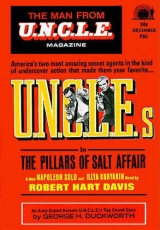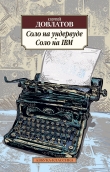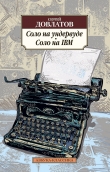
Текст книги "[Magazine 1967-12] - The Pillars of Salt Affair"
Автор книги: Bill Pronzini
Жанры:
Боевики
,сообщить о нарушении
Текущая страница: 1 (всего у книги 8 страниц)
The Pillars of Salt Affair
By Bill Pronzini
December 1967
Volume 4, Issue 5
One day a stream of life-giving water, the next an evil ribbon of salt—could Illya and Solo entrap the mad monster who had sworn to turn the world's great waterways into death traps? THRUSH had its most monstrous weapon in its hands—and only U.N.C.L.E. stood in the way!
PROLOGUE
ACT I: MISSION SALT WATER
ACT II: DEATH LIVES HERE
ACT III: THE RIM OF HELL
ACT IV: NO ESCAPE
ACT V: ONE-WAY DEATH STREET
ACT VI: STAND AND FIGHT
PROLOGUE
The three men walked single-file, climbing steadily upward along a pine-needled path that wound through heavy growth of Douglas fir and Sitka spruce. Below them, nestled in a valley bounded by rising slopes of heavy timberland, was the small lumber community of Kamewa, Oregon, from where they had begun their climb.
Although it was only early afternoon, the shadows in the wood were long and deep. Thin shafts of pale sunlight filtered through the leafy ceiling above them, and the air was cool and moist.
As the three men walked, they could smell the fresh, mingling odors of the fir and spruce, and that of growing moss, ferns, sweet syringa and Oregon grape. The only sound was their quiet footfalls on the spongy cushion of the path.
The man in the lead was dressed in a plaid hunting cap and a bright red-and green lumber jacket. He carried a Winchester .270 deer rifle in the crook of his arm. The other two men wore similarly colored jackets, and carried small canvas knapsacks and binocular cases slung over their shoulders.
They paused for a moment to rest, nearly three-quarters of the way up. The darker of the two men carrying the knapsacks took a handkerchief from his khaki trousers and wiped his forehead. The man in the plaid hunting cap grinned.
"Not used to hiking in the woods, eh?" he asked. "How much further is it?" Napoleon Solo said, squatting to massage his aching ankles. His feet seemed to be suffocating inside his tight hiking boots. They had been walking for over an hour.
"Not far," the man in the plaid hunting cap said, answering his question. "About a quarter of a mile."
"It seems to me," Illya Kuryakin commented dryly, "that you said the same thing two miles back."
The man's grin widened. His name was Barney Dillon, and he was a foreman at the Kamewa Lumber Company, located at the northern end of the town below. He had agreed to act as their guide when they had arrived in Kamewa that noon.
"You'll be able to see it when we crest the slope," Dillon said.
"Are you sure we couldn't have ridden up?" Solo asked.
"We could have," Dillon said, "if the road had been open. But we had a slide day before yesterday. Can't figure how it happened, this being the dry season, but it happened all right. They're still trying to clear the road."
Solo stood and adjusted the knapsack on his back. He had held some doubts from the beginning as to the authenticity of the report that had brought them to this isolated logging community near the Oregon coast, but he reserved final judgment until they had seen the reservoir for themselves. If they had hiked all this way to gaze upon the shimmering blue waters of a man-made lake, he was going to have a few words to say to the people of Kamewa. But then there was the plain fact that no water, not a drop, ran from any of the taps and faucets in the town.
"Well," Solo said with a joviality he did not feel at the moment, "let's press onward shall we?"
They began to walk again, moving along the path. When they reached the crest of the slope, some fifteen minutes later, Barney Dillon picked his way through a clump of tangled, decaying juniper and stood on a wide, flat sandstone rock. Solo and Illya clambered up to stand beside him.
"There it is," Dillon said.
Below them, at the foot of a smaller slope that fell away much more gradually than the one they had just climbed, lay the reservoir they had come to see. It was ringed with a thickly knit growth of fir and spruce.
Solo took the binoculars from the case on his shoulder and peered through them. The denseness of the trees afforded him sight of only patches of the reservoir, gleaming brightly in the sunlight.
He adjusted the glasses. It seemed to him that the gleam was not that of sun on water, not the bright silver shimmer of dancing light. It was more like, Solo thought, the blinding whiteness of sun on fresh snow, of sun on hot white beach sand.
He turned, looking at Illya Kuryakin. Illya brushed a strand of blond hair from his forehead and shrugged. He lowered his own glasses. He had gotten the same impression.
"Still the same," Dillon said. "Been that way since sometime last night."
"Let's go down for a closer look," Solo said.
They followed Barney Dillon as the big man picked his way down the slope. They had almost reached the bottom, were almost to the shoreline, when the growth thinned out enough to allow them a clear, unhindered view of the reservoir.
They stopped. It lay in front of them, a half-mile long and a quarter-mile wide. At the upper end, furthest away from where they stood, was the filtering plant, its pale green buildings shining dully in the sun. To one side lay the packed dirt road that led up from the town of Kamewa.
But Solo saw that with a cursory glance. His attention had been caught, and held, by the reservoir itself.
What he saw was not water.
What he saw was a solid white floor, unmoving, like the floor of a rock canyon. It shone a bleached, almost antiseptic white under the sun. The surface was irregular, almost but not quite flat, and its edges, where it touched the shore, were smooth and planed, like cement that had been carefully spread with a trowel to blend with the sloping landscape.
Solo turned to Barney Dillon.
"Salt," Dillon said. "Pure rock salt"
"I don't believe it," Illya Kuryakin said.
"Neither did I, the first time I saw it."
They scrambled down the rest of the way to the edge of the reservoir. Dillon moved out to stand on the surface. "It's solid," he said. "We checked it this morning when we came out."
Solo and Illya followed him. They had begun to smell the salt now. It was not the fresh, pungent odor of ocean salt, but more the dry biting odor of processed sodium chloride.
The doubts Solo had held before vanished. It was salt, all right. But how was it possible? Only yesterday, Dillon had told him, the reservoir had been brimming with clean, fresh water fed from streams that wound down from the mountains. Only yesterday the people of Kamewa had been drinking that water, had been using it to wash their clothes and irrigate their gardens.
Napoleon Solo said, "you first began to notice the change last night?"
Barney Dillon nodded. "the tap water tasted tacky at first," he said. "then later, it became undrinkable. Like sea water. Finally, about ten o'clock, the water supply shut off completely."
"You came up to investigate this morning?"
"First thing," Dillon said. "This is what we found."
Solo shook his head, glancing around him at the white surface of the reservoir. "Pure water hardening, crystallizing into rock salt. It's a scientific impossibility."
"Well it happened," Dillon said. "You can see for yourself."
"I would be willing to wager," Illya said, "that this is not a natural phenomenon."
"Hmm," Solo said thoughtfully. "Some new kind of chemical, most likely. Synthetically made. But for what reason? What purpose would it serve to turn a small mountain reservoir like this one into salt?"
"I don't know," Illya said. "but I'm beginning to get an uneasy feeling."
"I think I know what you mean," Solo said pointedly. He dropped to one knee and swung the knapsack from his back. He took a small geologist's pick from inside and chipped a piece free from the surface. He picked it up, sniffing it, and then touched the tip of his tongue to it.
"It doesn't taste or smell any differently than common rock salt." He said. He put the chip in the knapsack and stood again. "I think we had best get this off to U.N.C.L.E. as soon as possible. Maybe our laboratory scientists can—"
The bullet missed him by inches.
He heard the crack of the high-powered rifle a split instant before the bullet struck just to his left, sending splinters of salt flying, and he had no time to react then. But before the echoes of that first shot had died amongst the trees, both he and Illya had hurled themselves forward, in a low running crouch, towards the cover afforded by the growth at the bank of the reservoir.
The high-powered rifle barked again and Barney Dillon, slower to react than the two trained U.N.C.L.E. agents, staggered and pitched forward. Solo cursed, reversing himself, and grabbed the fallen man under the arms, dragging him into the growth. Illya Kuryakin lay flat on his stomach behind a gnarled tree stump, his U.N.C.L.E. special held in his right hand.
"Did you see where the shots came from?" Solo breathed.
"Up there," Illya said, pointing off to their left, some one hundred yards further down and another hundred up the slope.
As if to confirm his words, the rifle sounded again, and another spray of salt kicked up near them at the shore line. Solo saw the flash of the shot, and caught a quick glimpse of sunlight glinting off a rifle barrel.
He looked at Barney Dillon. The big man groaned. "Are you all right?" Solo asked him.
"My leg," Dillon said between clenched teeth.
Solo saw the blood on the trousers of his khakis. The bullet had caught him in the fleshy part of the right thigh. The wound did not appear to be serious.
Illya was peering off into the dense growth of the firs high on the slope. "Apparently somebody doesn't want us investigating his handiwork," he said.
"Did you see anybody when you were here this morning?" Solo asked Dillon.
Dillon shook his head. "We were only here for a minute before we started back."
"You were probably being watched through field glasses," Solo said. "Whoever it is must have orders to stop anybody who tries to take a sample of that salt. You're lucky you didn't try that before."
Illya said "Napoleon."
Solo looked at him. Illya pointed directly above them to where a bank of juniper grew. "If I can get through there, I can cut across to the blind side from the top."
Solo nodded. "I'll take the shoreline." He turned to Dillon. "Can you handle your rifle?"
Dillon had somehow managed to hang on to the Winchester when he had fallen. "I can handle it," he said.
"I hope you're a good shot," Illya said.
Dillon managed a little grim. "Good enough," he said. He rolled onto his stomach, putting the stock of the Winchester to his shoulder. He squinted along the sights. "Any time you're ready."
They waited for a moment. It was very quiet. The earlier, incessant chatter of Oregon towhees and blackbirds nesting in the trees had halted completely now, and the woods were still and silent, waiting.
"Now!" Illya whispered.
Barney Dillon opened up with the Winchester, squeezing off a volley of shots. Illya scrambled to his feet and started up the slope, running in a zigzag crouch, legs driving for footholds on the slippery bank. The high-powered rifle cracked, and Illya halted, diving headlong into a thick pile of ferns and waxy Indian Pipe.
Solo felt the muscles in his stomach constrict, thinking perhaps his friend had been hit, but then he saw Illya come up again, running, almost as quickly as he had gone down. The rifle whanged again and Illya ducked into the safety of the juniper.
Solo let out a breath. He moved then, running as Illya had in a zigzag, keeping well into the protection of the scrub fir that grew at the shoreline. Behind him he heard Dillon's Winchester, and above and ahead of him the echoing answer of the high-powered rifle. A limb on a small white fir to his left splintered as he ran, and he felt the tug of an angry hornet at the sleeve of his lumber jacket. But he kept moving forward, body tensed, muscles in his legs and back straining.
He saw a large outcropping of rock ahead of him, and veered toward it. He threw himself forward, skidding onto his stomach behind the rock. A pair of rifles, firing almost simultaneously, flashed above him, and a bullet ricocheted off the rock, whistling shrilly in his ears. A shower of dust fell on his neck.
Solo lay there for a moment, trying to get his breath. Two of them, he thought. He looked out around the side of the rock, peering upward. He could see nothing through the trees. He wondered where Illya was.
Behind him, Dillon squeezed off another shot from the Winchester. Two shots answered him almost immediately. Solo knew he must be almost directly beneath them now. And he knew as well that he could not stay where he was. His position was too vulnerable, the outcropping of rock affording only minimum protection.
To his left, he saw the long thick hulk of a felled Douglas fir. I was some thirty yards away, and further up the slope. Between it and the outcropping of rock was open ground. But if they were hidden in the trees higher up, it was just possible he could cross to the tree before they had a clear shot at him. He decided to change it. The U.N.C.L.E. agent got to his feet, bending in a low squat. Then he straightened and began to run.
He had gone fifteen of the thirty yards he needed, swiveling his body like a halfback threading his way through tacklers on a broken field run, when he saw them.
They had come down through the trees from their earlier position, and were moving towards him, two men in dark khakis. They noticed him at the same instant he saw them. They dropped to one knee, bringing his rifle up.
Solo was trapped. He knew he did not have enough time to reach the fallen tree before the man above him fired and his U.N.C.L.E. special was ineffective at this range. He did the only thing he could do.
In mid-stride, he allowed his body to go limp, dropping immediately, like a puppet with its strings cut. He brought the special up, knowing the uselessness of it, waiting for the shot and the bullet to plow into his body.
A shot rang out.
Solo, squinting upward from his prone position, saw the man with the high-powered rifle lean forward. He saw the rifle slip from the man's fingers, clattering down the spongy bank, and finally come to a halt only a few feet above where he lay. The man did not move.
Illya! Solo thought. The shot had come from above where the two men had been. He had made it around to them across the top of the slope.
The second man looked over his shoulder wildly, hesitating, and then began to run diagonally along the slope upward and to the west. Solo steadied his gun on his left arm and fired after the running man.
But the man ducked into thickly grown fir trees, and his shot missed. Two more shots sounded, from a revolver, and Solo knew that Illya was firing at the man as well. He saw a flash of color to his right and a blonde head emerged into view, giving chase after the fleeing man.
Solo stood. He knew he had no opportunity to catch the man himself. He walked to the body of the one Illya had shot.
He knelt down beside the man, examining him. He was short, with a balding head and sparse, pink eyebrows. Illya's bullet had taken him neatly through the side of the head, and he was quite dead. Solo had never seen him before.
The U.N.C.L.E. agent rummaged through the man's pockets. He found no identification, not even a wallet. But in the breast pocket of the lumber jacket the man wore, Napoleon Solo found a folded slip of paper.
He straightened, unfolding the paper. Printed on it were two lines of strange markings. They seemed to Napoleon Solo like an odd mixture of Morse code and Egyptian hieroglyphics. He heard footfalls and looked up. Illya was moving down towards him. He stopped next to Solo, panting a little.
"Lost him," Illya said. "Disappeared into the trees."
"What do you make of this?" Solo asked, handing him the paper.
Illya looked at it. "Code," he said.
"Yes," Solo said. "THRUSH code, unless I miss my guess."
"I rather thought I detected the cry of a small bird in the area," Illya said blandly.
Solo nodded. "What do you suppose this is all about?"
"I don't know," Illya said. "But if THRUSH is back of it, you know the rest Napoleon."
"I imagine Mr. Waverly will be interested in what's happened here today," Solo said. "We'd better get this code and the salt sample off to him right away."
"What about our friend there?"
"We'll send somebody back for him. He won't be going anywhere."
A hoarse shout sounded from their right. They turned. Barney Dillon came hoddling towards them, using his Winchester for a crutch. He was waving his free arm frantically.
They waited for him.
"You two all right?" he said when he reached them.
"Considering," Illya said.
"Well come on then," Dillon said. "You're not going to believe this."
"Believe what?" Solo asked.
But Dillon had already started down the slope. Solo looked at Illya, who shrugged. They followed him. They wound their way down through the trees, nearing the shoreline. The woods thinned out. The three men stopped abruptly, and Dillon pointed out towards the reservoir.
"Well?" he said. "What do you think of that?"
Solo and Illya stared.
"I think," Illya said with a resigned sigh after a moment, "that U.N.C.L.E. is in for another nasty battle, and that Napoleon and I are going to be right in the middle of it."
The surface of the reservoir before them was a deep blue-green color now, catching the sunlight from above in silver, dancing sparkles, and gentle, tiny waves of fresh, clear water lapped at the shoreline.
As if by some weird magic, the crystallized salt they had stood upon only a few minutes before had been transformed, and the water of the reservoir returned miraculously to its original state.
ACT I: MISSION SALT WATER
U.N.C.L.E. headquarters in Manhattan is an innocuous and unpretentious complex outwardly, including a tailor shop, an elaborate but artificial international aid organization, and The Mask club, a restaurant patterned after the many key clubs throughout the United States.
But beneath this facade is a fortress of concrete and steel. There are only four entrances, one of which is through secret tunnels from the river, and each of these is guarded by armed men and the ultimate in protective and alarm devices.
Napoleon Solo and Illya Kuryakin stood on the sidewalk in front of the main entrance to U.N.C.L.E. headquarters—Del Floria's tailor shop. They had just departed a taxi from Kennedy International Airport following their return flight from Oregon.
Both men were tired, having had little sleep the night before. After they had gotten Barney Dillon back to Kamewa the previous afternoon and, with some argument, to a doctor to have his leg checked, they had reported to Mr. Waverly in New York and had been instructed to make a thorough search of the area surrounding the reservoir.
One of the townspeople had volunteered to take the coded message and the salt sample to the nearest city for immediate transport to U.N.C.L.E. headquarters. Solo and Illya, accompanied by a group of armed loggers from the Kamewa Lumber Company, had then spent the intervening hours until nightfall in making a complete canvass of the timberland. They had found nothing—no camp sites, no evidence of hurried departure, no signs at all that anyone had even been in the area. The second man who had fired on them, and whoever else had been with him, had vanished, leaving no traces.
Now, the two agents crossed the sidewalk and entered the tailor shop. Since their efforts had been fruitless, they were hopeful that something of help had been unearthed by U.N.C.L.E. operations at this end.
Del Floria greeted them. As unpretentious as the facade, he was a tall, spare man in his early fifties, beginning to bald at the crown of his head. His manner was mild, almost meek, but hidden behind his light gray eyes was a photographic memory and a cat-like alertness that missed very little.
Del Floria knew every U.N.C.L.E. agent by sight. Should anyone not known to him attempt to gain entrance to the inner complex, he would have been immediately prevented and seized. For matters of his own safety and his invaluability to U.N.C.L.E., Del Floria knew nothing of what went on within the steel walls.
After exchanging amenities, Solo and Illya stepped into one of the small fitting rooms on one side of the room and drew the curtain closed behind them. When Del Floria had made sure no one was in sight, he activated one of the hidden levers know only to him.
The rear wall of the fitting room opened and Solo and Illya stepped through into the reception room on U.N.C.L.E. Square windowless, without doors of any kind, the room was furnished with a single desk, behind which a young blonde girl sat. In front of her was a panel of controls, none of which were labeled or otherwise identified and only she knew which button performed which purpose. As a measure of the rigid security of U.N.C.L.E. headquarters, the controls were changed periodically.
The girl smiled in greeting as Solo and Illya entered. The smile widened when Solo winked at her. She gave them their triangular identity badges.
Badges affixed to their suits, they walked through the maze-like innards of U.N.C.L.E. headquarters, their footsteps ringing on the steel floors. The badges they wore performed a definite purpose, for without them there would have been a triggering of the intricate U.N.C.L.E. alarm system and walls and doors would have closed, trapping them instantly. Twenty armed men would have surrounded them in a matter of seconds.
A swift and silent elevator took them up two floors. They turned left there, along another of the steel hallways. Doors opened as they approached, allowing them unhampered passage. When they reached the end of the hallway, they stood before an unmarked steel door, seemingly no different than any of the other doors through which they had just passed.
But this particular door held a most special significance. Behind it was the office of the chief of U.N.C.L.E. operations in New York, the office from which policy was dictated, from which decisions effecting the nations of the world were reached, from which the wheels of the entire U.N.C.L.E. organization were set into motion.
It was the office of Alexander Waverly, one of only five men who formed Section 1—Policy and Operations. The door opened and Solo and Illya stepped inside.
Alexander Waverly was somewhat of a legend, and a mysterious one at that. It was said that he had spent some fifty years in British and American intelligence, but no one knew this for a fact and Waverly never offered any enlightenment. Though his accent was British his speech was punctuated with the inflections a man acquires when he has lived his life in many countries.
He was fond of rough tweeds and pipes. He had absolute recall of vital facts and information, but he had extreme difficulty in remembering the names of the men he saw every day.
Outwardly, he resembled a tired and elderly bookkeeper, eyes heavily wrinkled at the corners as if he had spent his entire life squinting at columns of figures in a ledger. His appearance belied the quick deadlines of his mind, the respect and obedience he neither commanded nor asked for, but which he unfailingly received.
It was impossible to tell by looking at him what went on behind those gray eyes, as Solo and Illya well knew. Waverly turned one of the sheets of paper before him face down and scratched his thinning, but neatly-combed gray hair absently.
"Bad news," he said without looking up "Umm, yes. Bad news indeed."
Napoleon Solo sneezed—twice.
Waverly looked up. "Are you catching a cold, Mr. Solo?"
Solo sniffed. Illya said with a faint smile, "The mountain air doesn't agree with him."
"Yes," Waverly said. "Quite so." He picked up a letter opener from his desk and scratched at the blackened bowl of his pipe. "I have just been reading the chemical reports of the sample you gentlemen sent along."
"Were they able to analyze it?" Solo asked.
"Analyze it?" Waverly said. "Yes certainly, Mr. Solo. Of course."
"What were its properties?"
"Why salt, Mr. Solo. I expect you know that already."
"Yes sir?" Solo said patiently. "But what I meant was, were they able to determine what was added to the water to cause the crystallization?"
"Not as yet," Waverly said. "No. All that has been learned to date is that the salt is genuine, not a synthetic composition with fresh water as its base."
Illya frowned. "Then there wasn't any trace of foreign substance in that chip of salt?"
"No, Mr. Kuryakin," Waverly said. "None at all."
"That is bad news," Solo said.
"Eh?" Waverly said.
"Bad news," Solo said, sniffing. "You were saying that just a moment ago."
"No, no, Mrs. Solo," Waverly said. "I was referring to something quite different."
He shuffled through the papers on his desk again, found several sheets bound together with a brad, and peered at the top page. He handed it across the desk to Solo.
"Section III's weekly report, gentlemen."
Section III—Communications and Research—was commanded by red-headed May Heatherly, a very pretty and capable young lady. Part of her job was to compile each week a report, gleaned from the heads on U.N.C.L.E. agencies throughout the world, on current THRUSH activity and movement. These reports were invaluable to Waverly and the other members of Section I in mapping out counter-offensives and strategy in U.N.C.L.E. ceaseless duel with the power-mad THRUSH Council and their quest for world domination.
Solo read through the report. When he had finished, he handed it to Illya, frowning. "Nothing," he said.
"Exactly, Mr. Solo," Waverly said. "THRUSH activity is at a virtual standstill. I trust you realize the import of this?"
"Yes," Illya said. "The entire THRUSH operation has been mobilized into a single objective, a major offensive."
I daresay," Waverly said. "Each time THRUSH has become dormant, some sort of master scheme has been in the offing. I should think that this time will prove to be no different.
"Do you have any idea what they might be planning?"
"Not at the moment," Waverly said. "However, what you gentlemen witnessed in Oregon rather smacks of THRUSH work, wouldn't you say?"
"We had that though," Solo said.
"There have been other developments as well," Waverly said. "I expect you will be interested."
He stood and clamped his cold pipe between his teeth. He pressed a button on his desk, and then led them to the circular briefing table with the movable top at one end of the room. When they had seated themselves, a panel located on the wall slid back, to reveal a large screen.
The screen was operated by May Heatherly in Section 111. Presently, the gray screen lighted and an aerial film clip flashed in view. May Heatherly's voice came to them through the intercom network.
"this film was taken early this morning from an U.N.C.L.E. helicopter, three hours after we had received a report similar to the one from Oregon. It is a small lake in Northern Minnesota, in the foothills behind a resort community."
Illya and Solo and Waverly stared at the screen. Thick forest land surrounded the lake; the entire scene held a close resemblance to what Solo and Illya had seen in Kamewa. The film was in color, and the vivid green of the trees and the pale blue of the sky stood in bold contrast to the gleaming bleached whiteness of the lake itself. It lay silent and unmoving, like a pocket of fresh snow.
"Rock salt," Solo said softly.
"A team of U.N.C.L.E. agents attempted to reach the lake to investigate further" May Heatherly's voice said. "But a large rock slide had blocked the only road yesterday. They were forced to make a lengthy detour, and when they reached the lake this is what they found."
Another strip of film flashed onto the screen, this one having been shot from the sore of the lake. Placid blue water had replaced the glaring white of the aerial pictures.
Two succeeding bits of film were shown then, one of the tine dam in a Canadian province near Quebec, and the other of a lake in Alabama. Although both showed only blue water, May Heatherly explained that identical chemical changes had taken place in each. By the time U.N.C.L.E. investigators arrived, there had been no traces of the transformation, but eye-witness accounts attested to the validity of the report.
In each of the four wide-spread cases, including Kamewa, the bodies of water had been small, isolated, and accessible only be a single road, which had been rendered impassable by land or rock slides a day or two earlier.
When the screen had gone dark, ending the commentary, Illya said, "What do you suppose all of this means?"
"A definite pattern, Mr. Kuryakin," Waverly said. "THRUSH is no doubt carrying out a series of tests. They have devised some type of chemical which is capable of converting pure water into hardened salt, as well as the antidote which reverses the process, and are testing its capacities. Preparatory to the major offensive we were speaking about, I should think."
Solo tugged at his ear. "This chemical THRUSH apparently has takes several hours to crystallize water, but the antidote reverses almost immediately. I shudder to think of what they might be planning to use it for."
"Indeed," Waverly said. "That is why we must find out what they are intending and take steps to prevent it immediately. That is, of course, yours and Mr. Kuryakin's job."
"I rather thought it would be," Illya said. "But where do we start?"
"Perhaps the message you found on the man in Oregon holds the answer to that," Waverly said.
"Has it been decoded yet?" Solo asked.
"I am expecting a report presently," Waverly said. "When it arrives, we shall know better how we stand."
The report arrived shortly before four o'clock U.N.C.L.E. cryptographers, highly-skilled in their field, had finally managed to break what was to them a new and intricate THRUSH code. The message contained only two words, nothing more. But those two words were exactly the starting point Napoleon Solo and Illya Kuryakin needed.








